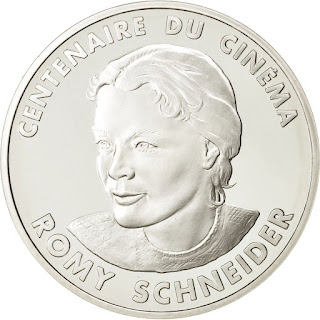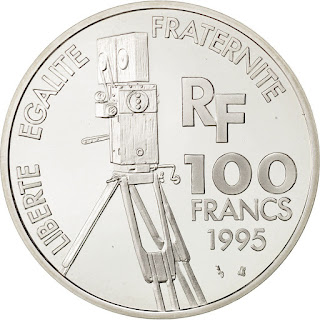France 100 Francs Silver Coin 1995 Actress Romy Schneider
Commemorative issue: 100th Anniversary of Cinema.
Obverse: Actress Romy Schneider
Lettering: CENTENAIRE DU CINÉMA ROMY SCHNEIDER
Engraver: Atelier de Paris.
Reverse: Lumière Cinématographe Camera (Cinématographe Lumière at the Institut Lumière, France)
Lettering: LIBERTÉ ÉGALITÉ FRATERNITÉ RF 100 FRANCS 1995
Edge: Smooth.
Value: 100 Francs.
Metal: Silver (.900).
Weight: 22.2 g.
Diameter: 37 mm.
Thickness: 2.2 mm.
Shape: Round.
Commemorative coins of France
100th Anniversary of Cinema
Charlie Chaplin Greta Garbo Romy Schneider
Romy Schneider
Romy Schneider (23 September 1938 – 29 May 1982) was a film actress born in Vienna who held German and French citizenship. She started her career in the German Heimatfilm genre in the early 1950s when she was 15. From 1955 to 1957 she played the central character of Empress Elisabeth of Austria in the Austrian Sissi trilogy. In 1958 she met Alain Delon and they became engaged; Schneider moved to France where she made successful and critically acclaimed films with some of the most notable film directors of that era. Her engagement to Delon ended in 1963 and Schneider subsequently married twice. The son from her first marriage died in an accident in 1981 when he was 14. In May 1982, aged 43, Schneider was found dead of cardiac arrest in her Paris apartment.
Early life
Schneider was born Rosemarie Magdalena Albach in Nazi-era Vienna, six months after the Anschluss, into a family of actors that included her paternal grandmother Rosa Albach-Retty, her Austrian father Wolf Albach-Retty and her German mother Magda Schneider. After her parents' divorce in 1945, Magda took charge of Romy and her brother Wolfi, eventually supervising the young girl's career, often appearing alongside her daughter. Her career was also overseen by her stepfather, Hans Herbert Blatzheim, a noted restaurateur who Schneider indicated had an unhealthy interest in her.
Early career
Romy Schneider's first film, made when she was 15, was Wenn der weiße Flieder wieder blüht (When the White Lilacs Bloom Again) in 1953, credited as Romy Schneider-Albach. In 1954, Schneider for the first time portrayed a royal, playing a young Queen Victoria in the Austrian film Mädchenjahre einer Königin (known in the U.S. as The Story of Vickie and in Britain as Victoria in Dover). Schneider's breakthrough came with her portrayal of Empress Elisabeth of Austria, in the romantic biopic Sissi (1955) and its two sequels, Sissi – The Young Empress (1956) and Sissi – Fateful Years of an Empress (1957), all with Karlheinz Böhm, who became a close friend. Less stereotypical films during this busy period include The Girl and the Legend (1957), working with a young Horst Buchholz, and Monpti (1957), directed by Helmut Käutner, again with Buchholz.
Schneider soon starred in Christine (1958), a remake of Max Ophüls's 1933 film Liebelei (itself based upon a play by Arthur Schnitzler and starring her mother Magda Schneider). It was during the filming of Christine that Schneider fell in love with French actor Alain Delon, who co-starred in the movie. She left Germany to join him in Paris and they announced their engagement in 1959.
Schneider decided to live and to work in France, slowly gaining the interest of film directors such as Orson Welles for The Trial (1962), based upon Franz Kafka's The Trial and was introduced by Delon to Luchino Visconti.
Under Visconti's direction, she gave performances in the Théâtre Moderne as Annabella (and Delon as Giovanni) in John Ford's stage play 'Tis Pity She's a Whore (1961) and in the film Boccaccio '70 (segment: "The Job"). In 1962 Schneider played Anna in Sacha Pitoëff's production of Chekhov's play The Seagull, also at the Théâtre Moderne. A brief stint in Hollywood included a starring role in Good Neighbor Sam (1964) a comedy with Jack Lemmon, while What's New Pussycat? (1965), although American financed, was shot in and around Paris. Schneider co-starred with Peter O'Toole, Peter Sellers and Woody Allen; the film was made from his first screenplay.
Schneider and Delon decided to split up in 1963 although they remained close lifelong friends. They continued to work together in such films as La Piscine (The Swimming Pool, 1968), which revitalized her career, and The Assassination of Trotsky (1972).
Later career
Schneider continued to work in France during the 1970s, most notably with director Claude Sautet on five films. Their first collaboration, The Things of Life (Les choses de la vie, 1970) with Michel Piccoli, was a great success and made Schneider an icon in France. The three colleagues teamed up again for the noir thriller Max et les Ferrailleurs (Max and the Junkmen, 1971), and she appeared with Yves Montand in Sautet's César et Rosalie (1972). Schneider portrayed Elisabeth of Austria again in Ludwig (1972), Visconti's film about the life of King Ludwig II of Bavaria. This time she played the Empress as a much more complex, mature, even bitter woman. "Sissi sticks to me just like oatmeal", Schneider once said.
Other successes from this period included Le Train (1973), where she played a German-Jewish refugee in World War 2, Claude Chabrol's thriller Innocents with Dirty Hands (Les innocents aux mains sales, 1975) with Rod Steiger, and Le vieux fusil (1975). The gritty That Most Important Thing: Love (L'important c'est d'aimer, 1974) garnered her first César Award (France's equivalent of the Oscar), a feat she repeated five years later, in her last collaboration with Sautet, for A Simple Story (Une histoire simple, 1978).
On 30 October 1974, Schneider created one of the most memorable moments on German television. She was the second guest on Dietmar Schönherr's talk show Je später der Abend (The Later the Evening) when she, after a rather terse interview, remarked passionately to the last guest, bank robber and author Burkhard Driest: "Sie gefallen mir. Sie gefallen mir sehr." (I like you. I like you a lot.)
She also acted in Le Trio infernal (1974) with Michel Piccoli, and in Garde à vue (1981) with Michel Serrault and Lino Ventura. An unpleasant incident occurred during this period with leading German film director Rainer Werner Fassbinder who wanted her to play the lead in his film The Marriage of Maria Braun (1979). Negotiations broke down when he called Schneider a "dumb cow", to which she responded by declaring she would never work with such a "beast". Fassbinder cast Hanna Schygulla instead, reviving his professional association with an actress to whom he had also been offensive.
Schneider starred in Bertrand Tavernier's Death Watch (La mort en direct, 1980) playing a dying woman whose last days are watched on national television via a camera implanted in the brain of a journalist (Harvey Keitel). It is based on David G. Compton's novel, Her last film was La Passante du Sans-Souci (The Passerby, 1982).
Personal life
Following the end of her relationship with Delon, Schneider married German director and actor Harry Meyen in July 1966. The couple had a son, David Christopher (1966–1981), but later divorced.
In 1975, Schneider married Daniel Biasini, her private secretary; they separated in 1981. Their daughter, Sarah Magdalena, is now an actress.
David, Schneider's son, died at the age of 14 after attempting to climb the spiked fence at his stepfather's parents' home and puncturing his femoral artery in the process. Schneider began drinking alcohol excessively after the death of David.
However, Claude Pétin—a friend of hers—said that she no longer drank at the time of her death. Pétin also said that Schneider's cardiac arrest was due to a weakened heart caused by a kidney operation she had had months before.
At the time of her death, Schneider was in a relationship with film producer Laurent Pétin.
Death
Schneider was found dead in her Paris apartment on 29 May 1982. It was suggested that she had committed suicide by taking a lethal cocktail of alcohol and sleeping pills. After another post-mortem examination was carried out, authorities declared that she had died from cardiac arrest.
Her tombstone at Boissy-sans-Avoir in the Canton of Montfort-l'Amaury bears the name Rosemarie Albach. Shortly afterwards, Delon arranged for David to be buried in the same grave.
Enduring popularity
The French journalist Eugène Moineau initiated in 1984 the Prix Romy Schneider. It is one of the most prestigious awards for upcoming actresses in the French film industry and is given by a jury each year in Paris in conjunction with the Prix Patrick Dewaere (formerly the Prix Jean Gabin). In 1990, the Austrian newspaper Kurier created the Romy TV Award in honour of Schneider. In 2003, she was voted 78th on the list of the greatest Germans in the German TV programme Unsere Besten (the German version of 100 Greatest Britons)—the second highest ranked actress (Marlene Dietrich was 50th) on that list. Until 2002, the Austrian Federal Railways InterCity service IC 535 from Wien Südbahnhof to Graz was named "Romy Schneider".
A movie about Schneider's life, titled Eine Frau wie Romy/Une femme comme Romy (A Woman Like Romy) was planned by Warner Bros. for 2009; Schneider's role was going to be played by Yvonne Catterfeld. The project was cancelled in July 2009. A musical about Schneider, Romy – Die Welt aus Gold (Romy – The Golden World) was premiered in 2009 at the Theater Heilbronn. In November 2009 the ARD broadcast the feature film Romy (de) with Jessica Schwarz in the title role.

